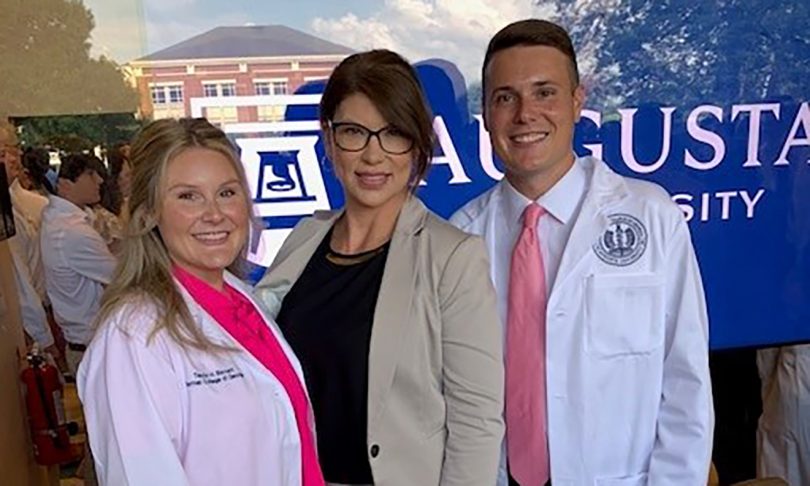Three weeks after having brain surgery to remove a rare type of tumor at Wellstar MCG Health, Shawn Neal was incredulous at how quickly her life was returning to normal.
“It’s crazy! Like, I’ll be walking around my house and I’m like, ‘I just had brain surgery.’ It’s just hard to believe,” she said.
Despite an eight-hour surgery, she only leaned on painkillers twice to manage her pain afterward, when it became significant. Otherwise, her regimen consisted of acetaminophen and ibuprofen.
“That’s unheard of! I mean, just incredible. Here I’ve had an eight-hour brain surgery, and I’m just using Tylenol and ibuprofen,” she said.
Within a month, Neal returned to her job as a dental hygienist at the Dental College of Georgia at Augusta University completely cancer free.
Her neurosurgeon, Dr. Salman Ali, also pointed out that she was able to stay local for her care.
“She doesn’t have to travel to go somewhere to get treatment. We can do this in-house,” he said.
That was very important to Neal, who is a 49-year-old single mother of two and foster mom to several rescue animals.
Neal had no symptoms of cancer. She was, however, having symptoms from a concussion she sustained in an accident, such as memory issues and headaches. She went to a neurologist, who ordered an MRI. That’s when the tumor was discovered growing out of a nerve in her brain.
It is a very rare type of brain tumor, and surgery is complicated because it requires carefully separating the good nerves from the damaged nerves in order to take the tumor out, said Dr. Ali, a neurosurgeon at Wellstar MCG Health and assistant professor of neurosurgery and director of skull base and pituitary at the Medical College of Georgia at Augusta University.
When Neal first received the diagnosis from another physician, it was recommended that she be monitored every six months to see if the tumor grew. Ali said he felt confident he could remove the whole tumor, at which point Neal would be cured and not need additional treatments like chemotherapy or radiation.
This type of nerve tumor is very rare. Only one person in about 4 million will have it, Ali said. It arises from the nerve that provides sensation to the face. Damage to it would hinder a patient’s ability to feel a gentle touch to their face.
In developing a plan to remove it, Ali considered factors beyond merely saving her life. For him, the impact of surgery on a patient’s quality of life after brain surgery is equally as important. His philosophy exemplifies Wellstar’s dedication to fostering a culture of care that goes beyond treatment.
“I think a lot of times we overlook that aspect of the cosmetic results for these patients,” he said.
In many cases, both the surgeon and the patient are focused only on getting the tumor out in the short term, and neither tend to think about the impact on quality of life afterward.
Ali tries to keep incisions small to minimize both pain and scarring. To look at Neal, you would never know she had a complex surgery on a rare brain tumor. Ali kept her incision small, behind her left ear.
He said the bigger the incision, the more pain you’re going to have and the more muscle atrophy you’re going to get. That makes the surgery more noticeable because it creates a depression. A shorter incision hides really well behind the ear. That means less muscle you have to take out, and it heals better and there is less pain.
“My goal is that if you go to the mall next week, nobody should be able to tell you had brain surgery,” Ali said.
He gave examples of many of his patients where he avoided making incisions on the skin. He went through the nose instead to remove tumors that are removed with more traditional open approaches. This prevents the patients from having visible scars, which can be constant reminders to them that they had brain surgery and can have significant social and career impact.
“I think you have to have a toolset and you have to offer different things. My goal is that we want to offer a variety of options for different patients, and we want to do something that is well suited for them,” he said.
Ali said his philosophy was shaped by a negative experience in the care of his son, who was born with a cyst. Being on the other side of the treatment plan and being unhappy with the outcome shaped his own approach to the patient experience. He tailors his treatment plans by considering what he would do if he were treating his own wife or son.
Neal and Ali both emphasized that while she is healing well with minimal pain, her case was not a simple surgery. It was a deep, complicated tumor. Neal said, “The entire situation was scary. After all, I knew they had to drill through my skull and navigate through my brain. It wasn’t pleasant by any means. But Dr. Ali and his care team went above and beyond to make the process run as smoothly and painlessly as possible.”
The surgery was performed on a Thursday, and she went home on Saturday able to move around and care for herself almost independently. Her headaches and vertigo have improved. She is still experiencing numbness in her left eye and double vision, which is to be expected given the tumor’s proximity to the nerves that operate the eye. She’s also experiencing numbness in other areas on the left side of her face.
Ali said all of this was expected and Neal is looking forward to making a full recovery.
Overall, she couldn’t be happier about the outcome, which is exactly what Ali was aiming for.
“I think the message here is this: even if you have a complex tumor, you just have to find the right people, and we can do this safely with great outcomes. You don’t need to go anywhere else. We have all the expertise we need right here,” Ali said.


